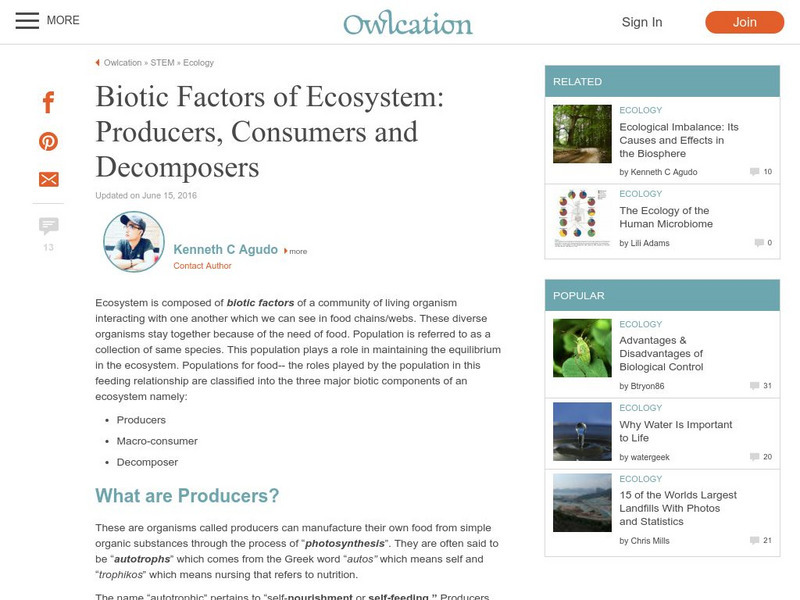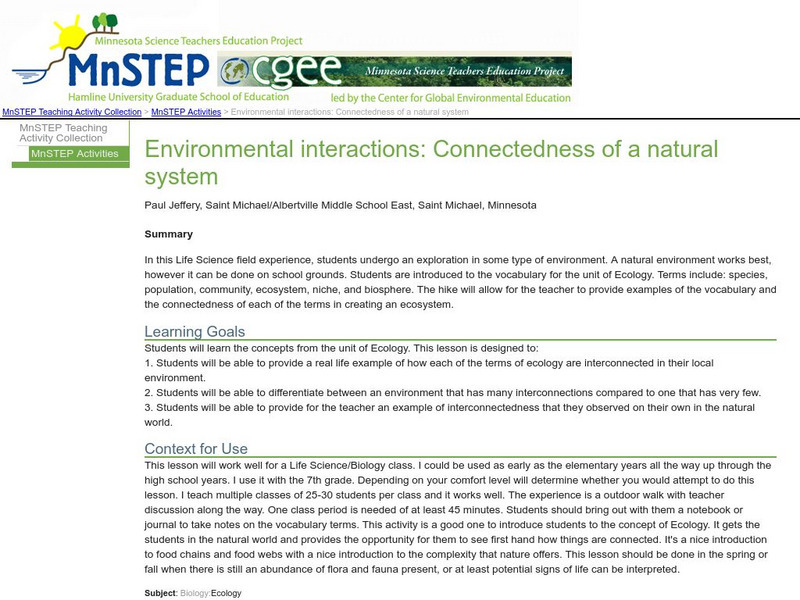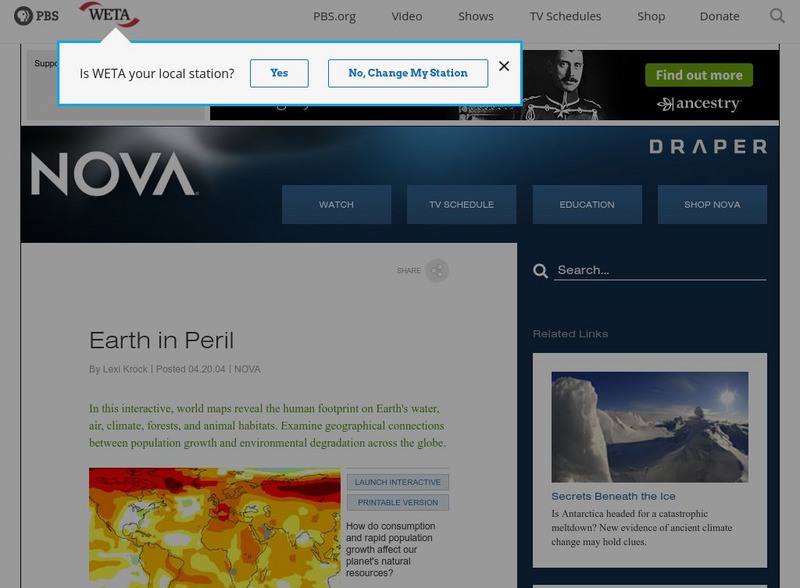Utah Education Network
Uen: Mini Ecosystems
Third graders will make small-scale environments and will describe interactions between living and nonliving things in their environments.
Science Education Resource Center at Carleton College
Serc: Lab 3: Oh What a Tangled Web: Ecosystem Based Management
A lab experiment in a series of experiments that looks at fisheries. In this particular lab, students use tools like Pacific Ocean Shelf Tracking to learn about the management of fisheries through an ecosystem-based approach. During this...
Science Education Resource Center at Carleton College
Serc: Investigative Case: Living in an Alkaline Environment
Explore living in an alkaline environment with this three-part interactive activity. During these activity students will complete web quests and activities to investigate the ecology and diversity of life in this environments.
BBC
Bbc: Geography: Sustainable Development in Northern Ireland
This extensive interactive website is designed for students to use to learn about farming, tourism, transportation, ecosystems, settlements and manufacturing in Northern Ireland.
Science Struck
Science Struck: Interspecific Competition: Definition, Examples
Interspecific competition in an ecosystem is explained, along with the different ways it can manifest itself. Includes examples in different types of biomes.
Other
Hub Pages: Biotic Factors of Ecosystem: Producers, Consumers and Decomposers
An ecosystem is composed of biotic factors of a community of living organisms interacting with one another which we can see in food chains/webs. These diverse organisms stay together because of the need of food. Population is referred to...
Other
Zephyrus: Food Puzzle Chain
Answer these ten interactive questions about ecological feeding relationships by choosing the correct image that completes each food chain.
Khan Academy
Khan Academy: Gallery: How Do Earth and Life Interact?
Explore the biosphere, zoom in on some unique ecosystems, and learn how activity in the Solar System and plate tectonics can affect the climate and life on the planet.
Other
Pde Sas: Relationships Among Organisms
In this lesson, students compare various types of relationships among organisms (i.e., biotic interactions). Students will: explain the roles of producers and consumers, and predators and prey in an ecosystem. Explain the levels of order...
CK-12 Foundation
Ck 12: Food Chains and Food Webs
[Free Registration/Login may be required to access all resource tools.] Videos, texts, activities, and assessments about food chains and food webs in an ecosystem.
American Museum of Natural History
American Museum of Natural History: O Logy: Dive Into Worlds Within the Sea
Learn about three different marine ecosystems: coral reefs, the continental shelf, and the deep sea. Interactive game included, which will help players chart the interrelationships among organisms that live in each ecosystem.
PBS
Pbs Learning Media: How Disruptions Affect Animal Populations
Students explore the effects that ecosystem disruptions can have on animal populations. They learn about the disruptions that have driven three species-the Madagascar fish eagle, the Iberian lynx, and the rowi kiwi, to the brink of...
Other
The Habitable Planet Simulation
This activity is designed to accompany an interactive on the Annenberg Learner website. Students investigate the changes that take place in an ecosystem when they alter the organisms in a food web. As they work with the simulation, they...
PBS
Pbs Learning Media: Reclaiming Habitat for Honeybees
Explore the role of pollinators in their ecosystems, develop a written response to one of three questions about the importance of honeybees, gather evidence about Coal Country BeeWorks' efforts to reclaim surface mining sites,.
ClassFlow
Class Flow: Understanding Ecosystems
[Free Registration/Login Required] This flipchart will help students to learn about ecosystems and the living and nonliving things that interact in them.
Science Education Resource Center at Carleton College
Serc: Environmental Interactions: Connectedness of a Natural System
A field experience where students undergo an exploration in a natural environment. They are introduced to the concepts of species, population, community, ecosystem, niche, and biosphere.
PBS
Nova: Earth in Peril
A series of nine maps with accompanying explanations. They show how population growth has affected the environment around the world in terms of water availability, climate change, land and forest use, and more. There are both interactive...
US Fish and Wildlife Service
U.s. Fish and Wildlife Service: Wetlands, Marshes, Tracks in the Mud
This resource presents information about wetland ecosystems and the importance of habitat conservation in this resource and then try an interactive activity to identify tracks of wetland animals.
Kidport
Kidport: Life in the Sea
Teachers can utilize this colorful interactive site so that students can explore the wonderful world of sea animals. Use this site to learn their characteristics and living environments.
Annenberg Foundation
Annenberg Learner: The Habitable Planet: Ecology Lab
Create the parameters of your own ecosystem by choosing which producers and consumers live there. Visualize how the food web operates and species populations change. This simulator mimics the food web within a typical ecosystem and gives...
TeachEngineering
Teach Engineering: Computer Simulation of the Sonoran Desert Community
The computer program's simulation of a Sonoran desert community should ultimately strengthen the student's comprehension of what is required for a natural ecosystem to sustain itself (remain in balance). This computer simulation program...
Georgia Department of Education
Ga Virtual Learning: Ap Biology: Ecology
Students review the study of living things and make connections back to Earth's systems. This unit focuses on how various species, grouped in populations and communities, work with the nonliving things around them to ensure survival.
BiologyWise
Biology Wise: Examples of Mutualism
Describes the role of mutualism in an ecosystem and the different types, and provides examples.
American Museum of Natural History
American Museum of Natural History: O Logy: Stuff to Do: Web of Life Game
Fun, interactive game that helps students identify interrelationships in an ecosystem. For six or more players.


















